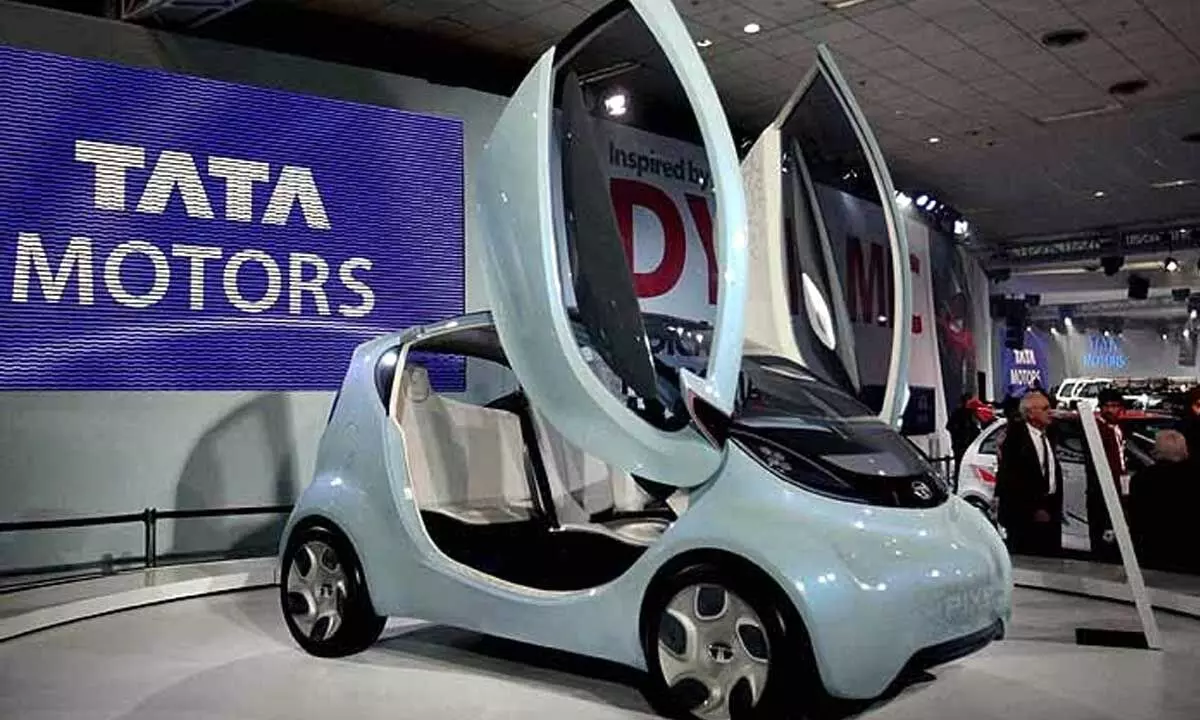Tata Motors Q2 loss narrows to Rs. 945 cr on improved sales
The auto major had reported a net loss of Rs 4,442 cr, attributable to shareholders of the company, in the July-September period of the last fiscal
image for illustrative purpose

New Delhi: Tata Motors on Wednesday reported narrowing of consolidated net loss at Rs 945 crore for the second quarter ended September 30, as sales picked up in marquee brand Jaguar Land Rover and across domestic as well as commercial vehicle segments.
The auto major had reported a net loss of Rs 4,442 crore, attributable to shareholders of the company, in the July-September period of the last fiscal. Consolidated net loss for the second quarter stood at Rs 898 crore. It was at Rs 4,416 crore in the year-ago period. Total income increased to Rs 80,650 crore in the period under review, as compared to Rs 62,246 crore in the year-ago period, Tata Motors said in a regulatory filing.
On a standalone basis, the company reported a net loss of Rs 293 crore. It had posted a net loss of Rs 659 crore in the year-ago period. Total income rose to Rs 15,142 crore in the second quarter, as compared to Rs 11,197 crore in the same period last year. Jaguar Land Rover (JLR), a part of Tata Motors, reported revenues of 5.3 billion pounds in the second quarter, up 36 per cent from the year ago period. Its wholesale volumes (excluding China JV) stood at 75,307 units in July-September period, up 17.6 per cent as compared to the same period last year. The wholesale increase was lower than planned, primarily due to a lower-than-expected supply of specialised chips from one supplier which could not be readily re-sourced in the quarter, Tata Motors said. JLR is continuing to focus on signing long-term partnership agreements with chip suppliers which is improving visibility of future chip supply, it said. "Demand for our most profitable and desired vehicles remains strong and we expect to continue to improve our performance in the second half of the year, as new agreements with semiconductor partners take effect, enabling us to build and deliver more vehicles to our clients," JLR CEO Thierry Bollore stated.
The auto major noted that its commercial vehicle business registered a 15 per cent growth in sales over the second quarter of last fiscal. For India business, domestic wholesales stood at 93,651 vehicles, up 19 per cent year-on-year. However, exports were at 6,771 vehicles, lower by 22 per cent affected by the financial crisis in few export markets, it said. "Going forward, we continue to remain in the agile mode and are keeping a close watch on the evolving geopolitical, inflation and interest rate risks on both supply and demand," Tata Motors Executive Director Girish Wagh said.
The passenger vehicles business continued its strong momentum with wholesales at 1,42,755 vehicles, up 69 per cent year-on year, amid strong festive demand and debottlenecking actions, the automaker said. "Demand for passenger vehicles remained strong in Q2 FY23 fuelled by improving supply of semiconductors, festive season and new launches," Tata Motors Passenger Vehicles Managing Director Shailesh Chandra noted. In electric vehicles, the company posted sales of 11,522 units in Q2FY23, registering a growth of 326 per cent over the same period last year, he added. "Going forward, we remain vigilant about the evolving demand and supply situation and will stay nimble to take necessary actions swiftly, whilst focusing on improving profitability further," Chandra said.
On overall business outlook, the auto maker stated that demand continues to remain strong, however will remain a key monitorable in wake of global uncertainties. "Improving chip supply and cooling commodity prices will aid revenue and margins recovery and hence aim to deliver strong improvements in EBIT and free cash flows in H2 FY23," it added.
In a separate filing, Tata Motors said it has notified the New York Stock Exchange on Wednesday of its intent to voluntarily delist its American Depositary Shares (ADS), each representing five ordinary shares of the company, par value of Rs 2 per share. Since the ADSs were issued in 2004, the company has witnessed a considerable increase in liquidity and foreign shareholder participation in the equity stock markets in India, it added. Shares of the company on Wednesday closed 0.44 per cent down at Rs 433 apiece on the BSE.

